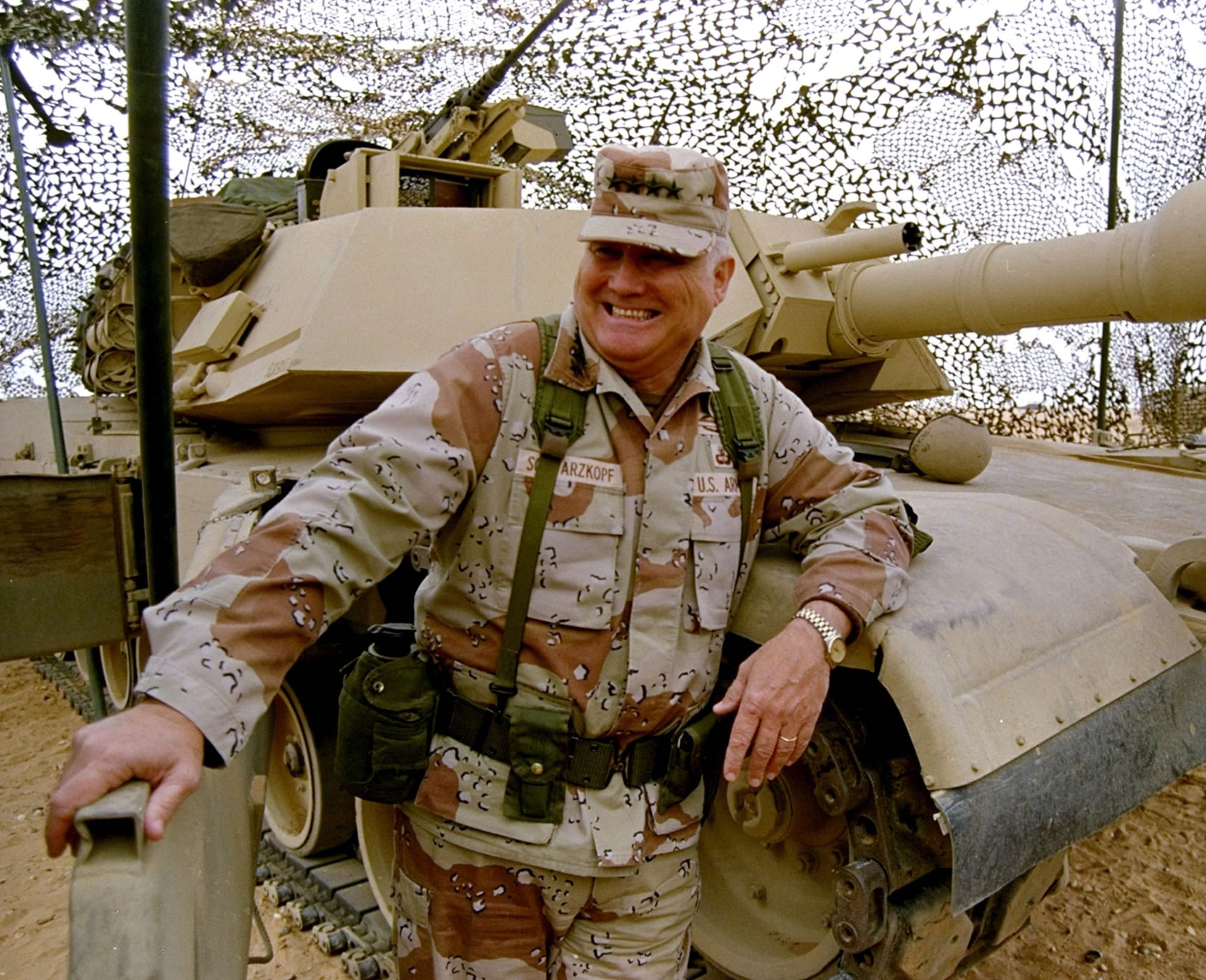WASHINGTON — Truth is, retired Gen. H. Norman Schwarzkopf didn’t care much for his popular “Stormin’ Norman” nickname.
The seemingly no-nonsense Desert Storm commander’s reputed temper with aides and subordinates supposedly earned him that rough-and-ready moniker. But others around the general, who died Thursday in Tampa, Fla., at age 78 from complications from pneumonia, knew him as a friendly, talkative and even jovial figure who preferred the somewhat milder sobriquet given by his troops: “The Bear.”
That one perhaps suited him better later in his life, when he supported various national causes and children’s charities while eschewing the spotlight and resisting efforts to draft him to run for political office.
He lived out a quiet retirement in Tampa, where he’d served his last military assignment and where an elementary school bearing his name is testament to his standing in the community.
Schwarzkopf capped an illustrious military career by commanding the U.S.-led international coalition that drove Saddam Hussein’s forces out of Kuwait in 1991 — but he’d managed to keep a low profile in the public debate over the second Gulf War against Iraq, saying at one point that he doubted victory would be as easy as the White House and the Pentagon predicted.
Schwarzkopf was named commander in chief of U.S. Central Command at Tampa’s MacDill Air Force Base in 1988, overseeing the headquarters for U.S. military and security concerns in nearly two dozen countries stretching across the Middle East to Afghanistan and the rest of central Asia, plus Pakistan.
When Saddam invaded Kuwait two years later to punish it for allegedly stealing Iraqi oil reserves, Schwarzkopf commanded Operation Desert Storm, the coalition of some 30 countries organized by President George H.W. Bush that succeeded in driving the Iraqis out.
At the peak of his postwar national celebrity, Schwarzkopf — a self-proclaimed political independent — rejected suggestions that he run for office, and remained far more private than other generals, although he did serve briefly as a military commentator for NBC.
While focused primarily on charitable enterprises in his later years, he campaigned for President George W. Bush in 2000, but was ambivalent about the 2003 invasion of Iraq. In early 2003 he told The Washington Post that the outcome was an unknown: “What is postwar Iraq going to look like, with the Kurds and the Sunnis and the Shiites? That’s a huge question, to my mind. It really should be part of the overall campaign plan.”
Initially Schwarzkopf had endorsed the invasion, saying he was convinced that Secretary of State Colin Powell had given the United Nations powerful evidence of Iraqi weapons of mass destruction. After that proved false, he said decisions to go to war should depend on what U.N. weapons inspectors found.
He seldom spoke up during the conflict, but in late 2004 he sharply criticized Defense Secretary Donald H. Rumsfeld and the Pentagon for mistakes that included erroneous judgments about Iraq and inadequate training for Army reservists sent there.
Schwarzkopf was born Aug. 24, 1934, in Trenton, N.J., where his father, Col. H. Norman Schwarzkopf Jr., founder and commander of the New Jersey State Police, was then leading the investigation of the Lindbergh kidnap case.
As a teenager Norman accompanied his father to Iran, where the elder Schwarzkopf trained the Iran’s national police force and was an adviser to Reza Pahlavi, the young Shah of Iran.
Young Norman studied there and in Switzerland, Germany and Italy, then followed in his father’s footsteps to West Point, graduating in 1956 with an engineering degree. After stints in the U.S. and abroad, he earned a master’s degree in engineering at the University of Southern California and later taught missile engineering at West Point.
In 1966 he volunteered for Vietnam and served two tours, first as a U.S. adviser to South Vietnamese paratroops and later as a battalion commander in the U.S. Army’s Americal Division. He earned three Silver Stars for valor — including one for saving troops from a minefield — plus a Bronze Star, a Purple Heart and three Distinguished Service Medals.
While many career officers left military service embittered by Vietnam, Schwarzkopf was among those who opted to stay and help rebuild the tattered Army into a potent, modernized all-volunteer force.



